- Home
- Lemony Snicket
A Series of Unfortunate Events Collection: Books 1-13 with Bonus Material Page 2
A Series of Unfortunate Events Collection: Books 1-13 with Bonus Material Read online
Page 2
A Series of Unfortunate Events #11: The Grim Grotto
Dear Reader
For Beatrice—
Chapter One
After a great deal of time examining oceans, investigating rainstorms, and…
Chapter Two
“Right down here!” the echoey voice said, as the Baudelaire…
Chapter Three
The expression “Shiver me timbers!” comes from the society of…
Chapter Four
The expression “fits like a glove” is an odd one, because…
Chapter Five
When you are invited to dine, particularly with people you…
Chapter Six
“You youngsters look very spiffy in those helmets!” Phil said, with…
Chapter Seven
The word “lousy,” like the word “volunteer,” the word “fire,” the…
Chapter Eight
The water cycle consists of three phenomena: evaporation, precipitation, and…
Chapter Nine
If you are considering a life of villainy—and I certainly…
Chapter Ten
The way sadness works is one of the strange riddles…
Chapter Eleven
“Aye!” Fiona said. “Aye! Aye! Aye! We’ll take you with…
Chapter Twelve
The expression “the tables have turned” is not one the…
Chapter Thirteen
The water cycle consists of three phenomena—evaporation, precipitation, and…
To My Kind Editor
A Series of Unfortunate Events
Credits
Copyright
A Series of Unfortunate Events #12: The Penultimate Peril
Dear Reader
For Beatrice—
Chapter One
Certain people have said that the world is like a…
Chapter Two
If you were to hold this book up to a mirror, you…
Chapter Three
There are places where the world is quiet, but…
Chapter Four
When the elevator finally reached the roof, and the doors…
Chapter Five
When the elevator reached the sixth story,…
Chapter Six
When the elevator reached the third story,…
Chapter Seven
Quite a few things happened that day after…
Chapter Eight
The word “denouement” is not only the name…
Chapter Nine
“Ha!” Count Olaf shrieked, pointing at…
Chapter Ten
“What was that?” a voice called out.
Chapter Eleven
An old expression, used even before the schism,…
Chapter Twelve
The man with a beard but no hair stood up from…
Chapter Thirteen
“Ha!” Count Olaf crowed. “This takes the cake!”…
To My Kind Editor
A Series of Unfortunate Events
Credits
Copyright
A Series of Unfortunate Events #13: The End
Dear Reader
For Beatrice—
Chapter One
If you have ever peeled an onion, then you know…
Chapter Two
It is useless for me to describe to you how…
Chapter Three
As I’m sure you know, there are many words in…
Chapter Four
By the time the Baudelaire orphans returned to Ishmael’s tent,…
Chapter Five
Unless you are unusually insouciant—which is merely a fancy way…
Chapter Six
At this point, you may find yourself recognizing all of…
Chapter Seven
The predicament of the Baudelaire orphans as they sat abandoned…
Chapter Eight
Thinking about something is like picking up a stone when…
Chapter Nine
The phrase “in the dark,” as I’m sure you know,…
Chapter Ten
Ishmael stepped out of the darkness, running a hand along…
Chapter Eleven
Perhaps one night, when you were very small, someone tucked…
Chapter Twelve
It is a curious thing, but as one travels the…
Chapter Thirteen
It is a well-known but curious fact that the first…
Chapter Fourteen
The last entry in the Baudelaire parents’ handwriting in A…
To My Kind Editor
A Series of Unfortunate Events
Credits
Copyright
Dire Diversions
About the Author
About the Publisher
A Series of Unfortunate Events #1: The Bad Beginning
A Series of Unfortunate Events
BOOK the First
THE BAD BEGINNING
by LEMONY SNICKET
Illustrations by Brett Helquist
Dear Reader,
I’m sorry to say that the book you are holding in your hands is extremely unpleasant. It tells an unhappy tale about three very unlucky children. Even though they are charming and clever, the Baudelaire siblings lead lives filled with misery and woe. From the very first page of this book when the children are at the beach and receive terrible news, continuing on through the entire story, disaster lurks at their heels. One might say they are magnets for misfortune.
In this short book alone, the three youngsters encounter a greedy and repulsive villain, itchy clothing, a disastrous fire, a plot to steal their fortune, and cold porridge for breakfast.
It is my sad duty to write down these unpleasant tales, but there is nothing stopping you from putting this book down at once and reading something happy, if you prefer that sort of thing.
With all due respect,
Lemony Snicket
To Beatrice—
darling, dearest, dead,
CHAPTER
One
If you are interested in stories with happy endings, you would be better off reading some other book. In this book, not only is there no happy ending, there is no happy beginning and very few happy things in the middle. This is because not very many happy things happened in the lives of the three Baudelaire youngsters. Violet, Klaus, and Sunny Baudelaire were intelligent children, and they were charming, and resourceful, and had pleasant facial features, but they were extremely unlucky, and most everything that happened to them was rife with misfortune, misery, and despair. I’m sorry to tell you this, but that is how the story goes.
Their misfortune began one day at Briny Beach. The three Baudelaire children lived with their parents in an enormous mansion at the heart of a dirty and busy city, and occasionally their parents gave them permission to take a rickety trolley—the word “rickety,” you probably know, here means “unsteady” or “likely to collapse”—alone to the seashore, where they would spend the day as a sort of vacation as long as they were home for dinner. This particular morning it was gray and cloudy, which didn’t bother the Baudelaire youngsters one bit. When it was hot and sunny, Briny Beach was crowded with tourists and it was impossible to find a good place to lay one’s blanket. On gray and cloudy days, the Baudelaires had the beach to themselves to do what they liked.
Violet Baudelaire, the eldest, liked to skip rocks. Like most fourteen-year-olds, she was right-handed, so the rocks skipped farther across the murky water when Violet used her right hand than when she used her left. As she skipped rocks, she was looking out at the horizon and thinking about an invention she wanted to build. Anyone who knew Violet well could tell she was thinking hard, because her long hair was tied up in a ribbon to keep it out of her eyes. Violet had a real knack for inventing and building strange devices, so her brain was often filled with images of pulleys, levers, and gears, and she never wanted to be distracted by something as trivial as her hair. This morning she was thin
king about how to construct a device that could retrieve a rock after you had skipped it into the ocean.
Klaus Baudelaire, the middle child, and the only boy, liked to examine creatures in tide-pools. Klaus was a little older than twelve and wore glasses, which made him look intelligent. He was intelligent. The Baudelaire parents had an enormous library in their mansion, a room filled with thousands of books on nearly every subject. Being only twelve, Klaus of course had not read all of the books in the Baudelaire library, but he had read a great many of them and had retained a lot of the information from his readings. He knew how to tell an alligator from a crocodile. He knew who killed Julius Caesar. And he knew much about the tiny, slimy animals found at Briny Beach, which he was examining now.
Sunny Baudelaire, the youngest, liked to bite things. She was an infant, and very small for her age, scarcely larger than a boot. What she lacked in size, however, she made up for with the size and sharpness of her four teeth. Sunny was at an age where one mostly speaks in a series of unintelligible shrieks. Except when she used the few actual words in her vocabulary, like “bottle,” “mommy,” and “bite,” most people had trouble understanding what it was that Sunny was saying. For instance, this morning she was saying “Gack!” over and over, which probably meant, “Look at that mysterious figure emerging from the fog!”
Sure enough, in the distance along the misty shore of Briny Beach there could be seen a tall figure striding toward the Baudelaire children. Sunny had already been staring and shrieking at the figure for some time when Klaus looked up from the spiny crab he was examining, and saw it too. He reached over and touched Violet’s arm, bringing her out of her inventing thoughts.
“Look at that,” Klaus said, and pointed toward the figure. It was drawing closer, and the children could see a few details. It was about the size of an adult, except its head was tall, and rather square.
“What do you think it is?” Violet asked.
“I don’t know,” Klaus said, squinting at it, “but it seems to be moving right toward us.”
“We’re alone on the beach,” Violet said, a little nervously. “There’s nobody else it could be moving toward.” She felt the slender, smooth stone in her left hand, which she had been about to try to skip as far as she could. She had a sudden thought to throw it at the figure, because it seemed so frightening.
“It only seems scary,” Klaus said, as if reading his sister’s thoughts, “because of all the mist.”
This was true. As the figure reached them, the children saw with relief that it was not anybody frightening at all, but somebody they knew: Mr. Poe. Mr. Poe was a friend of Mr. and Mrs. Baudelaire’s whom the children had met many times at dinner parties. One of the things Violet, Klaus, and Sunny really liked about their parents was that they didn’t send their children away when they had company over, but allowed them to join the adults at the dinner table and participate in the conversation as long as they helped clear the table. The children remembered Mr. Poe because he always had a cold and was constantly excusing himself from the table to have a fit of coughing in the next room.
Mr. Poe took off his top hat, which had made his head look large and square in the fog, and stood for a moment, coughing loudly into a white handkerchief. Violet and Klaus moved forward to shake his hand and say how do you do.
“How do you do?” said Violet.
“How do you do?” said Klaus.
“Odo yow!” said Sunny.
“Fine, thank you,” said Mr. Poe, but he looked very sad. For a few seconds nobody said anything, and the children wondered what Mr. Poe was doing there at Briny Beach, when he should have been at the bank in the city, where he worked. He was not dressed for the beach.
“It’s a nice day,” Violet said finally, making conversation. Sunny made a noise that sounded like an angry bird, and Klaus picked her up and held her.
“Yes, it is a nice day,” Mr. Poe said absently, staring out at the empty beach. “I’m afraid I have some very bad news for you children.”
The three Baudelaire siblings looked at him. Violet, with some embarrassment, felt the stone in her left hand and was glad she had not thrown it at Mr. Poe.
“Your parents,” Mr. Poe said, “have perished in a terrible fire.”
The children didn’t say anything.
“They perished,” Mr. Poe said, “in a fire that destroyed the entire house. I’m very, very sorry to tell you this, my dears.”
Violet took her eyes off Mr. Poe and stared out at the ocean. Mr. Poe had never called the Baudelaire children “my dears” before. She understood the words he was saying but thought he must be joking, playing a terrible joke on her and her brother and sister.
“‘Perished,’” Mr. Poe said, “means ‘killed.’”
“We know what the word ‘perished’ means,” Klaus said, crossly. He did know what the word “perished” meant, but he was still having trouble understanding exactly what it was that Mr. Poe had said. It seemed to him that Mr. Poe must somehow have misspoken.
“The fire department arrived, of course,” Mr. Poe said, “but they were too late. The entire house was engulfed in fire. It burned to the ground.”
Klaus pictured all the books in the library, going up in flames. Now he’d never read all of them.
Mr. Poe coughed several times into his handkerchief before continuing. “I was sent to retrieve you here, and to take you to my home, where you’ll stay for some time while we figure things out. I am the executor of your parents’ estate. That means I will be handling their enormous fortune and figuring out where you children will go. When Violet comes of age, the fortune will be yours, but the bank will take charge of it until you are old enough.”
Although he said he was the executor, Violet felt like Mr. Poe was the executioner. He had simply walked down the beach to them and changed their lives forever.
“Come with me,” Mr. Poe said, and held out his hand. In order to take it, Violet had to drop the stone she was holding. Klaus took Violet’s other hand, and Sunny took Klaus’s other hand, and in that manner the three Baudelaire children—the Baudelaire orphans, now—were led away from the beach and from their previous lives.
CHAPTER
Two
It is useless for me to describe to you how terrible Violet, Klaus, and even Sunny felt in the time that followed. If you have ever lost someone very important to you, then you already know how it feels, and if you haven’t, you cannot possibly imagine it. For the Baudelaire children, it was of course especially terrible because they had lost both their parents at the same time, and for several days they felt so miserable they could scarcely get out of bed. Klaus found he had little interest in books. The gears in Violet’s inventive brain seemed to stop. And even Sunny, who of course was too young to really understand what was going on, bit things with less enthusiasm.
Of course, it didn’t make things any easier that they had lost their home as well, and all their possessions. As I’m sure you know, to be in one’s own room, in one’s own bed, can often make a bleak situation a little better, but the beds of the Baudelaire orphans had been reduced to charred rubble. Mr. Poe had taken them to the remains of the Baudelaire mansion to see if anything had been unharmed, and it was terrible: Violet’s microscope had fused together in the heat of the fire, Klaus’s favorite pen had turned to ash, and all of Sunny’s teething rings had melted. Here and there, the children could see traces of the enormous home they had loved: fragments of their grand piano, an elegant bottle in which Mr. Baudelaire kept brandy, the scorched cushion of the windowseat where their mother liked to sit and read.
Their home destroyed, the Baudelaires had to recuperate from their terrible loss in the Poe household, which was not at all agreeable. Mr. Poe was scarcely at home, because he was very busy attending to the Baudelaire affairs, and when he was home he was often coughing so much he could barely have a conversation. Mrs. Poe purchased clothing for the orphans that was in grotesque colors, and itched. And the two Poe children—Edg
ar and Albert—were loud and obnoxious boys with whom the Baudelaires had to share a tiny room that smelled of some sort of ghastly flower.
But even given the surroundings, the children had mixed feelings when, over a dull dinner of boiled chicken, boiled potatoes and blanched—the word “blanched” here means “boiled”—string beans, Mr. Poe announced that they were to leave his household the next morning.
“Good,” said Albert, who had a piece of potato stuck between his teeth. “Now we can get our room back. I’m tired of sharing it. Violet and Klaus are always moping around, and are never any fun.”
“And the baby bites,” Edgar said, tossing a chicken bone to the floor as if he were an animal in a zoo and not the son of a well-respected member of the banking community.
“Where will we go?” Violet asked nervously.
Mr. Poe opened his mouth to say something, but erupted into a brief fit of coughing. “I have made arrangements,” he said finally, “for you to be raised by a distant relative of yours who lives on the other side of town. His name is Count Olaf.”

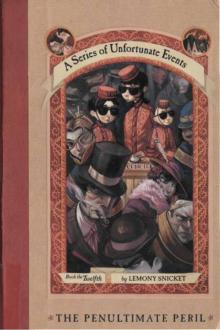 The Penultimate Peril
The Penultimate Peril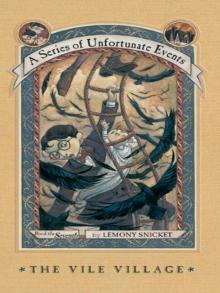 The Vile Village
The Vile Village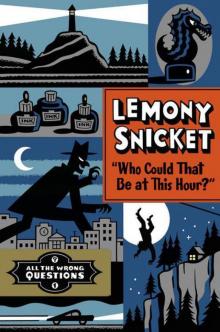 Who Could That Be at This Hour?
Who Could That Be at This Hour?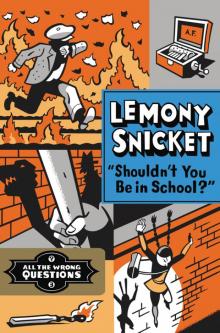 Shouldn't You Be in School?
Shouldn't You Be in School?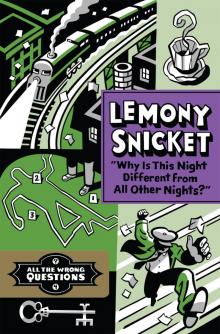 Why Is This Night Different From All Other Nights?
Why Is This Night Different From All Other Nights?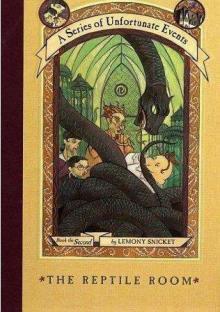 The Reptile Room
The Reptile Room File Under: 13 Suspicious Incidents (1-6)
File Under: 13 Suspicious Incidents (1-6) The End
The End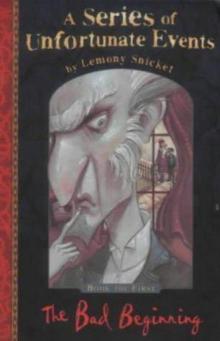 The Bad Beginning
The Bad Beginning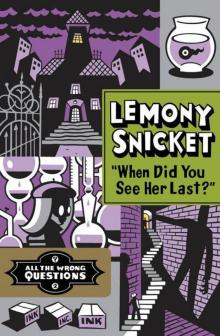 When Did You See Her Last?
When Did You See Her Last?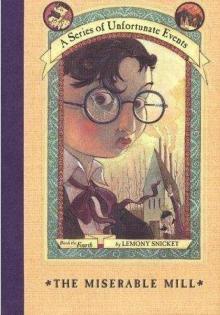 The Miserable Mill
The Miserable Mill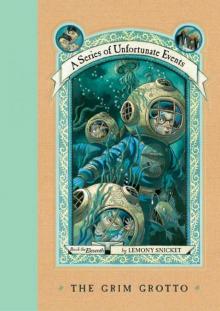 The Grim Grotto
The Grim Grotto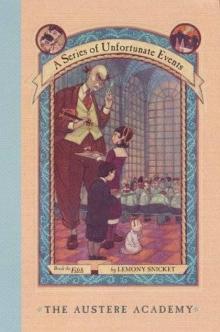 The Austere Academy
The Austere Academy The Ersatz Elevator
The Ersatz Elevator The Wide Window
The Wide Window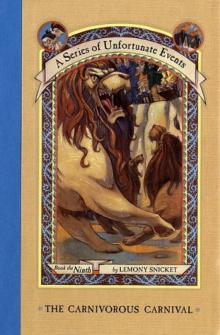 The Carnivorous Carnival
The Carnivorous Carnival A Series of Unfortunate Events Box: The Complete Wreck
A Series of Unfortunate Events Box: The Complete Wreck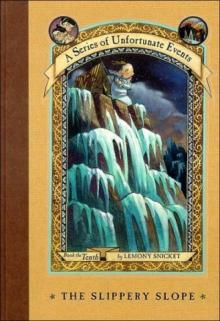 The Slippery Slope
The Slippery Slope Read Something Else
Read Something Else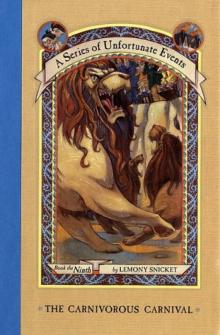 The Carnivorous Carnival asoue-9
The Carnivorous Carnival asoue-9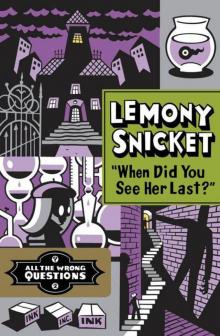 When Did You See Her Last
When Did You See Her Last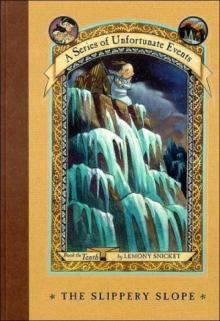 The Slippery Slope asoue-10
The Slippery Slope asoue-10 The Hostile Hospital asoue-8
The Hostile Hospital asoue-8 A Series of Unfortunate Events Collection: Books 1-13 with Bonus Material
A Series of Unfortunate Events Collection: Books 1-13 with Bonus Material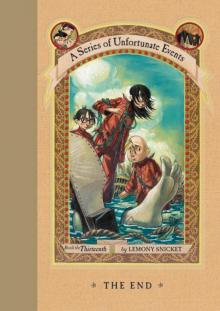 The End asoue-13
The End asoue-13 File Under
File Under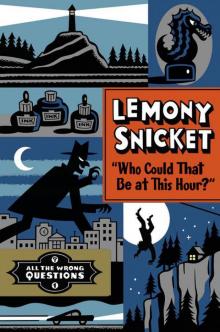 Who Could That Be at This Hour? (All the Wrong Questions)
Who Could That Be at This Hour? (All the Wrong Questions)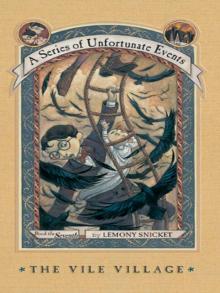 The Vile Village asoue-7
The Vile Village asoue-7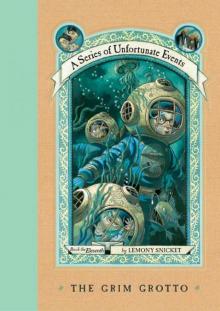 The Grim Grotto asoue-11
The Grim Grotto asoue-11